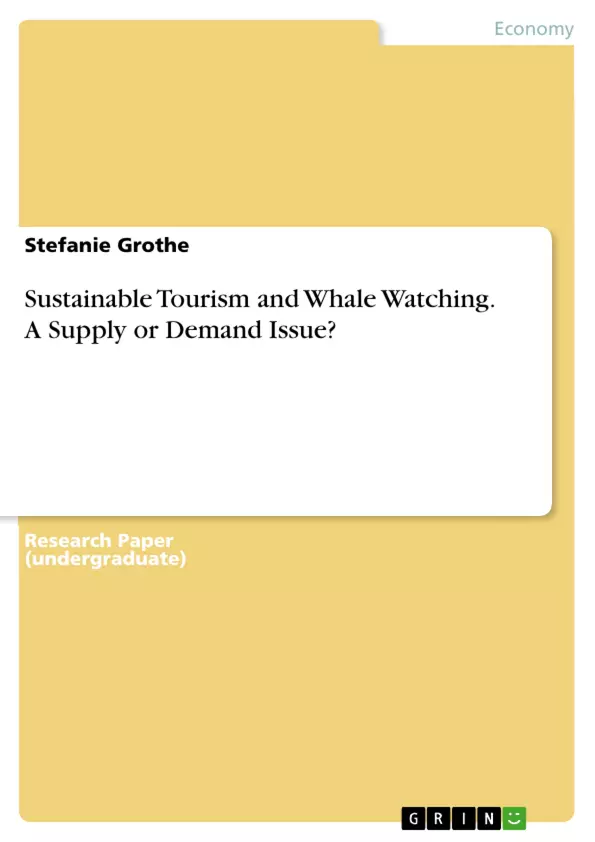This study is about sustainable tourism and CSR focussing on the Whale Watching industry and the increasing number of Whale Watching tour operators. Primary research was used to get a knowledge about the question if sustainable tourism is a demand or supply issue.
The number of WW companies as well as the CSR certified companies, raised up in the last years. In 2010 the first WW organization has been CSR certified. In the last years more and more ecolabels were established. There is no specific WW ecolabel yet but there is the question if a CSR certification would makes sense for the WW industry. Today, every company wants to be “green” and certified by any ecolabel. Nearly every company tries to be “green”, but most of those companies pretend to be green for a better image. But why should a company get certified when lots of people do not know what the certification means. And is it necessary to be certified or do the customers have to be more sustainable?
Inhaltsverzeichnis (Table of Contents)
- Introduction
- Background - Whale Watching
- CSR-Literature Review
- Code of Conduct
- Methodology - Desk research / Interview
- Research Question
- Desk Research
- Sample
- Research finding
- Discussion
- Conclusion
- Appendix
- References
Zielsetzung und Themenschwerpunkte (Objectives and Key Themes)
This paper investigates the role of Corporate Social Responsibility (CSR) in the whale watching (WW) industry, specifically exploring whether sustainability is primarily a demand or supply issue. It aims to analyze the perspectives of both consumers and tourism operators.- The evolution of CSR in the WW industry
- The impact of ecolabels and certification on sustainable practices
- The role of consumer demand in driving sustainable behavior
- The challenges and benefits of implementing CSR in the WW sector
- The need for a code of conduct within the WW industry
Zusammenfassung der Kapitel (Chapter Summaries)
- Introduction: This section provides a general overview of the increasing importance of CSR and ecolabels in the tourism industry, particularly within the WW sector. It highlights the growing trend of companies claiming to be "green" while raising questions about the effectiveness and true meaning of these certifications.
- Background - Whale Watching: This chapter introduces the concept of WW as a tourism activity, discussing its growth and potential impact on whale populations. It examines the role of ecolabels in ensuring responsible practices and the challenges associated with educating tourists about sustainable whale watching.
- CSR-Literature Review: This chapter explores the concept of CSR in tourism, particularly in the context of the WW industry. It defines CSR and its components, outlining the benefits and challenges associated with achieving CSR certification. The chapter also examines criticisms of voluntary CSR programs, emphasizing the need for accountability and monitoring.
Schlüsselwörter (Keywords)
This paper focuses on the concepts of Corporate Social Responsibility (CSR), sustainability, whale watching (WW), ecolabels, tourism, demand, supply, and consumer behavior. The research explores the role of CSR certifications in promoting responsible practices and investigates the effectiveness of voluntary programs in the context of the WW industry. It also analyzes the influence of consumer preferences on sustainable tourism practices.Frequently Asked Questions
Is sustainable whale watching a demand or supply issue?
The research explores whether operators offer sustainable tours because they want to (supply) or because customers actively ask for certified green options (demand).
What is Corporate Social Responsibility (CSR) in tourism?
CSR refers to tourism companies taking responsibility for their impact on society and the environment, often through voluntary certifications and ethical codes of conduct.
Do ecolabels matter for whale watching?
Ecolabels help distinguish responsible operators, but the study questions if customers actually understand what these certifications mean during their booking process.
What is "greenwashing" in the travel industry?
Greenwashing occurs when a company pretends to be environmentally friendly for a better image without actually implementing meaningful sustainable practices.
How does whale watching impact marine life?
While it promotes conservation awareness, excessive or irresponsible boat traffic can stress whale populations, making a strict code of conduct necessary.
- Quote paper
- Stefanie Grothe (Author), 2011, Sustainable Tourism and Whale Watching. A Supply or Demand Issue?, Munich, GRIN Verlag, https://www.grin.com/document/294262



